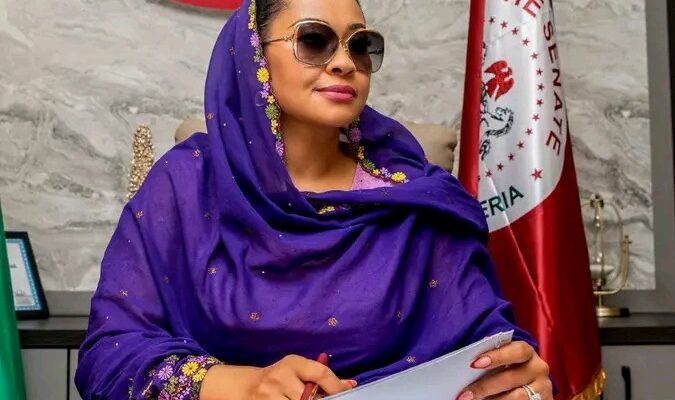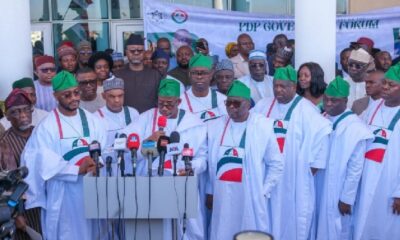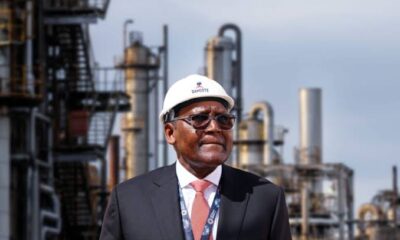News
Empowerment projects now conduit for embezzlement – ICPC

The Independent Corrupt Practices and Other Related Offences Commission has raised concerns over what it described as politicisation of empowerment projects in Nigeria.
ICPC also revealed that empowerment programmes had become significant conduits for embezzlement and mismanagement of public funds.
This was revealed in the Phase VI report of the constituency and executive projects tracking exercise, which was released by the commission on Thursday.
A total of 1721 government-funded projects with a total value of N284, 602,881,868.57 were tracked during the exercise which spanned from November 2023 to May 2024.
In the report, the ICPC identified numerous instances where empowerment items, which are intended for poverty alleviation and to support the most vulnerable, were procured but hoarded by project facilitators for potential use in political campaigns.
The report added that of the total tracked projects, 26.1 per cent—or 449 projects—were categorised as empowerment initiatives, amounting to over N35.5 billion in contract awards.
The report partly read, “Empowerment items are meant to be distributed to intended beneficiaries to empower them or to serve as poverty alleviation items. These items were procured but hoarded by the project facilitators possibly for electoral campaign activities.
“Large-scale soft/fluid projects and empowerment projects as major conduits for siphoning public resources: Empowerment/soft projects deserve special attention in this report in view of their increasing propensity within the budget as more project sponsors now prefer to embed such projects for execution in the budget.
“In the course of Phase VI project tracking, it was discovered that the aggregate number of empowerment projects tracked amounts to 449 empowerment projects (26.1% of the total tracked projects), while the aggregate sum/value of contract award on empowerment projects is N35,585,340,728.91.
“In all the shenanigans found in the course of tracking empowerment projects, contractors, project facilitators as well as the executing agencies staff cannot be excused of gross connivance.
The ICPC further revealed that in agencies such as the North East Development Commission and the Hydro-Electric Power Producing Areas Development Commission, empowerment items were handed over to stakeholders instead of directly reaching the intended recipients.
News
Lawmaker Slams NBA Over Rivers Crisis, Demands Return of N300m

News
BREAKING: Unknown gunmen reportedly storm Senator Natasha’s family residence

Senator Natasha Akpoti-Uduaghan’s family residence in Kogi was reportedy invaded by gunmen around 1 a.m. on Tuesday, April 16, leaving damaged windows but no injuries.
The incident happened at her hometown residence in Obeiba-Ihima, located in Okehi Local Government Area of Kogi State.
Sources familiar with the event said the attackers arrived around 1:00 a.m. Armed with cutlasses and guns, they damaged parts of the building, smashing windows and causing panic in the area. At least three men were involved in the attack.
Senator Natasha’s Chief Security Officer, Yakubu Ovanja, quickly informed the appropriate security agencies.
In response, officers from the Okehi Police Division rushed to the scene.
Although nobody was hurt and no suspects have been arrested yet, security officials recorded the extent of the damage and launched a preliminary investigation.
The reason behind the attack is still unknown, and as of now, Senator Akpoti-Uduaghan has not released any official statement. She represents Kogi Central in the Senate and is known as a vocal figure in Nigerian politics.
According to Zagazola Makama, police are still trying to figure out what motivated the attackers and are working to find those responsible.
News
SAD! Again, Alleged Herdsmen Attack Three Benue Communities

The communities came under simultaneous attacks just a day after the killing of 11 persons at Otobi Community also in Otukpo LGA.
Benue has in the past decade experienced incessant attacks.
Suspected herdsmen have again stepped up violent attacks as no fewer than three communities in the Otukpo Local Government Area (LGA) of Benue State were attacked on Wednesday.
The communities affected during the fresh attacks include Emichi, Odudaje, and Okpamaju all in Otukpo where five persons were killed in February. The communities came under simultaneous attacks just a day after the killing of 11 persons at Otobi Community also in Otukpo LGA.
Local sources confirm that several people may have been feared dead again in the fresh attack.
Wednesday’s attack came hours after Governor Hyacinth Alia confirmed the arrest of three suspected herders in connection with the invasion of Otobi village on Tuesday night.
When contacted, Otukpo LGA Chairman, Maxwell Ogiri, confirmed the attack on the three communities, saying that the attackers stormed the communities at the time when the Commissioner of Police was still at the Ochidoma Palace over the previous day’s attack on Otobi.
He added that three people sustained injury in the attacks on the three communities, leading to women and children abandoning the communities for fear of being killed.
“Only young men were in the communities when the attackers arrived. The prompt response from combined security operatives made the attackers flee and none of them were arrested,” Ogiri stated.
The police spokesperson in the state, Sewuese Anene, was yet to confirm details of the attacks on the three communities.
-

 News22 hours ago
News22 hours agoPDP governors declare support for Tinubu
-

 News23 hours ago
News23 hours agoHope for Nigerians as Dangote refinery slashes petrol price again
-

 News23 hours ago
News23 hours agoRivers Emergency Rule: Abbas inaugurates 21-member panel
-

 News22 hours ago
News22 hours agoN1.3trn CBEX Scam: EFCC caution Nigerians against Ponzi Schemes
-

 News35 minutes ago
News35 minutes agoBREAKING: Unknown gunmen reportedly storm Senator Natasha’s family residence
-

 News9 hours ago
News9 hours agoFG expresses sympathy for CBEX victims, urges a united effort to combat Ponzi schemes
-

 News3 hours ago
News3 hours agoSnub story on removal of Rivers Sole Administrator, it’s FAKE-Chief Registrar
-

 News9 hours ago
News9 hours ago“How my father escaped assassination” – Bishop Oyedepo’s daughter

















